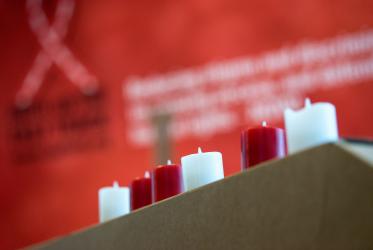Religious leaders and faith-based organizations are sending representatives this week to a United Nations civil society hearing in New York City, a prelude to a UN High Level Meeting on HIV in New York on 8-10 June.
Through the Live the Promise HIV Campaign, the World Council of Churches Ecumenical Advocacy Alliance (WCC-EAA), in consultation with WCC Ecumenical HIV and AIDS Initiatives and Advocacy, WCC-EAA participating organizations and other partners, is supporting religious leaders as they meet with their government representatives to help draft a new Political Declaration.
Many are advocating for a declaration that will guarantee zero new HIV infections in babies; zero deaths among children and adults; and zero stigma and discrimination by the year 2030.
WCC is calling for the Political Declaration to:
Address the root causes of vulnerability to HIV. A global response to HIV should place the leadership of people living with and most affected by HIV at the centre of the global response.
Achieve universal access to HIV prevention, treatment, care and support. No one should be left behind in achieving the “Fast Track” targets: 95% of people living with HIV knowing their status; 95% of people who know their status on treatment; and 95% of people on treatment with suppressed viral load; with fewer than 200 000 people newly infected with HIV; fewer than 200,000 people dying from AIDS-related causes; and elimination of HIV-related stigma and discrimination.
Eliminate stigma and discrimination. The declaration should commit to eliminating HIV-related stigma and discrimination among service providers in healthcare, workplace and educational settings, including through trainings and evidence-based effective interventions.
Ensure an independent accountability mechanism to monitor the implementation of the Political Declaration. The declaration should commit to a clear accountability mechanism that builds on previous monitoring systems.
Countdown to High Level Meeting
Religious leaders and faith-based organizations are also taking part in a 100-day “countdown” to the High Level Meeting. Photos featured on the UNAIDS website depict people from around the world holding daily messages about what ending AIDS means to them.
“It is crucial that our collective voice as religious leaders and faith-based organizations is a voice that carries both clarity and hope,” says Francesca Merico, HIV campaign coordinator for the WCC-EAA. “As we all count down to the High Level Meeting, our pilgrimage for justice and peace will be present in our messages, our photos and our prayers.”
The Ecumenical Advocacy Alliance, an ecumenical initiative of the World Council of Churches, is a global network of churches and related organizations committed to campaigning together on common concerns for justice and human dignity. Current campaign issues are HIV and AIDS, food security and sustainable agriculture.
The Live the Promise Campaign of the Ecumenical Advocacy Alliance seeks continued priority on the response to HIV and AIDS, the elimination of stigma, and a significant faith-based contribution to the vision of ‘getting to zero’ – zero new infections, zero discrimination, and zero AIDS-related deaths.
More information on the Ecumenical Advocacy Alliance Live the Promise HIV Campaign
Human rights standards must guide response to HIV, WCC urges (WCC press release of 11 March 2016)








